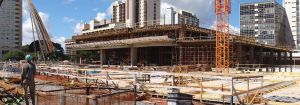"The first four to five months of 2010 has seen plenty of work for us, especially in the up-market residential property sector," said Andrew Derbidge, a structural engineer working with Patridge Partners in NSW. "It's probably because several projects that were shelved in 2009, due to the global financial crisis (GFC), were back up again."
For a number of reasons, however, the levels of activity are waning. With much of the work tied in with the residential property sector, it is expected there will be continued demand for structural engineering work. This work is expected to be from the demand for medium-density type buildings (apartments, etc.) from the major capital cities across Australia, all of which are experiencing continued population growth.
With structural engineering covering a broad range of industries, from mining to buildings, the past calendar year has obviously seen mixed results across the board. But one sector where structural engineering companies and structural engineers have experienced a boom is in mining in Western Australia. As a result of the high level of demand for Australian resources, mainly from China, structural engineers across the country have been relocating to work in WA for lucrative salaries and excellent conditions.
Several of the big regional economies, like China, India and some of the South East Asian economies are continuing growth exponentially. Therefore, demand for minerals will continue rising, which is good news for Australia.
Additionally, the government's infrastructure projects, as part of its stimulus package to reinvigorate the economy, has given plenty of work for structural engineers. With a range of bridges, roads, school halls and so on, being built or renovated, structural engineering companies have been kept busy.
But Andrew shares the concern of many in the Australian engineering sector of a shortage of skilled engineers to do the work at hand. With fewer students of engineering enrolling or graduating from universities, the sector has had to look beyond our shores for skilled labour.
"Our company has increased its engineering workforce and about a third of its engineers are foreign – qualified structural engineers from the United Kingdom and Ireland," said Andrew. "In a way it all fits perfectly. With the economic downturn in Europe, and the volume of engineering work in Ireland hitting rock-bottom, more and more Irish engineers are heading this way, to fill the supply shortage."
Experts in the engineering sector see no quick fixes to the labour supply shortage. It is something that tertiary institutions can do very little about either, in terms of a short-term solution. Till then, hiring foreign engineers seems to be the only viable answer.
Meanwhile, on the technological and innovations front, the recent introduction of higher strength concrete is resulting in bigger structures, like buildings and bridges, which are being built to cater to the needs of the growing population. As far as computer aided designing (CAD) and new design programs are concerned, the structural engineering sector is slow to change – relying more on the tried and tested programs to meet the challenges of the future.
With regional economic growth to continue well into the future, there are many industries and sectors in which Australian structural engineers and engineering services will be in high demand. Be it in engineering services for ships, aircraft, hotels, bridges or roads.
But structural engineering companies do express one major area of concern. With competition increasing, the pressure on companies has been to reduce fees.
"To be competitive, structural engineering firms are forced to reduce their fees, but the onus is still on such firms to continue delivering quality services as before," explained Andrew. "This is an area that has caused some concern in the industry."

